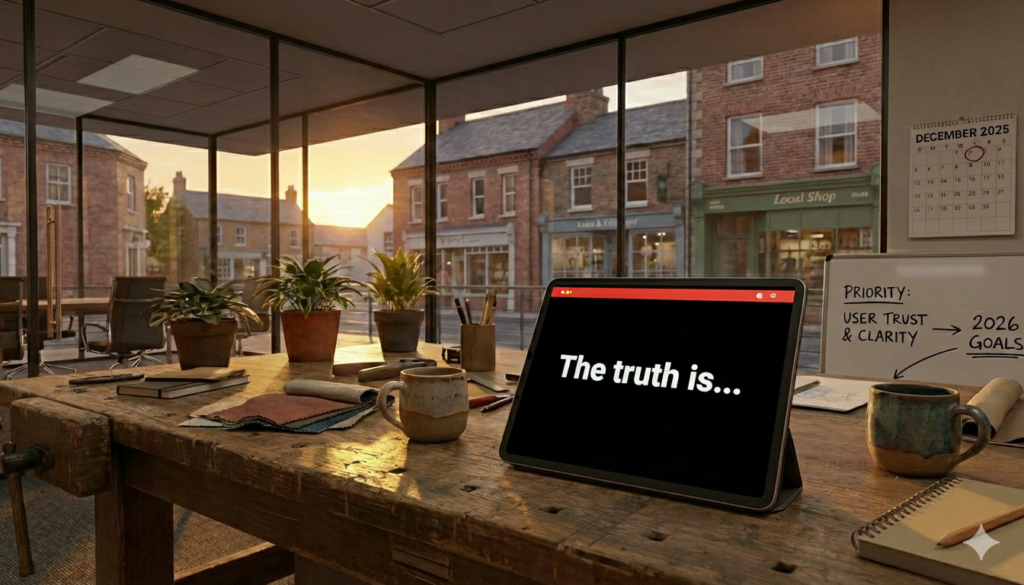
For the past decade, if you wanted your business to show up in Google, you obsessed over phrases like “best web designer near me” or “top plumber in Kent”. You’d pepper your website with location keywords, create service pages stuffed with variations of the same phrase, and cross your fingers that Google would rank you above your competitors.
That playbook is dying. Fast.
With ChatGPT, Perplexity, Google’s AI Overviews, and other AI-powered search tools now answering millions of queries daily, the rules have changed. These systems don’t care about your keyword density. They care about whether you can actually answer someone’s question.
Let me show you what this means in practice.
The Old Way: Gaming the Algorithm
Here’s what traditional SEO looked like for a Kent web design business (I should know – I’ve been doing this for over 20 years):
- Create a page targeting “web design Kent”
- Add variations: “website design Kent”, “web designers in Kent”, “Kent website designers”
- Sprinkle in “near me” variations
- Build backlinks with exact-match anchor text
- Hope Google’s algorithm picks you
It worked. Sort of. You’d rank for those specific phrases, but only if someone typed those exact words into Google. And even then, you were competing with dozens of other businesses doing exactly the same thing.
The New Reality: AI Wants Answers, Not Keywords
When someone asks ChatGPT or Google’s AI “I need a website for my small business but I’m not sure where to start”, they’re not searching for keywords. They’re asking a genuine question.
The AI doesn’t scan for “best web designer near me”. Instead, it looks for content that:
- Directly answers the question – What does someone actually need to know?
- Demonstrates expertise – Does this source really understand the topic?
- Provides context – Are there caveats, considerations, or next steps?
- Sounds natural – Is this written for humans, not algorithms?
Here’s the crucial difference: traditional Google wanted to know what you do. AI search wants to know how you think about problems and why your approach works.
A Real Example: mtstudios.net
Let me use my own business as an example. For years, we had a services page that said things like:
“mtstudios offers professional web design services in Kent and the surrounding areas. As experienced website designers, we create bespoke websites for small businesses.”
Perfectly fine for traditional SEO. Terrible for AI search.
Now? Our content sounds more like this:
“Most small businesses don’t need a £10,000 website. What you need is something that loads quickly, works on mobile, and actually brings in customers. Our monthly packages start at £50 because we’ve spent 20 years figuring out what small businesses actually use versus what agencies try to sell them.”
See the difference? The second version:
- Answers an unspoken question (“How much should I spend?”)
- Demonstrates expertise through experience
- Provides actual guidance, not just keywords
- Sounds like a human talking to another human
When an AI is asked “How much should a small business spend on a website?”, it can actually cite that second version. The first version? It’s just noise.
What AI Search Engines Actually Look For
After testing this extensively with our own clients and monitoring how AI tools cite content, here’s what makes content “AI-friendly”:
1. Answer Questions That Haven’t Been Asked Yet
Don’t just respond to “How much does web design cost?” Think about the real questions behind that:
- “Why do some websites cost £500 and others cost £50,000?”
- “What happens if I cheap out on my website?”
- “Should I use Wix or hire someone?”
When you address these deeper questions, AI systems recognize your content as comprehensive and trustworthy.
2. Use Natural Language (Like You’re Talking to a Friend)
AI is trained on conversations. It understands and prefers content that sounds conversational. Compare these:
Robotic (Old SEO): “Our web design services deliver ROI-focused solutions for SMEs seeking digital transformation.”
Human (AI-friendly): “We build websites that actually make you money. No jargon, no six-month projects, just websites that work.”
3. Be Specific About Your Process
Vague claims don’t help AI systems. Specific examples do:
Vague: “We optimize websites for search engines.”
Specific: “We make sure your site loads in under 3 seconds, works perfectly on mobile, and includes proper meta descriptions for every page. These aren’t fancy extras – they’re basics that 70% of small business websites get wrong.”
4. Address Objections and Alternatives
AI loves balanced content. Don’t pretend you’re perfect or that there are no other options:
“Look, not every business needs a custom website. If you’re testing an idea and need something up quickly, Squarespace or Wix might be perfect for you. But if you’re serious about SEO, need specific functionality, or want to own your content outright, that’s when a proper website makes sense.”
That kind of honesty? AI systems cite it because it’s helpful.
The Location Problem (and Solution)
“But wait,” you’re thinking, “don’t I need to mention I’m in Kent so local customers find me?”
Yes, but differently.
Old way: “We’re web designers in Kent serving Maidstone, Rochester, Chatham, and Gillingham.”
New way: Work location naturally into your expertise:
“We’ve been working with Kent businesses since 2004. When Southeastern Rail disrupts your commute for the hundredth time, at least your website is still working. We understand local businesses because we are one – we know what matters to a Canterbury shop owner is different from what matters to a tech startup in Tunbridge Wells.”
The location is there, but it’s wrapped in actual value and personality. AI can extract the geographic relevance while also understanding you’re not just keyword stuffing.
What This Means for Your Content Strategy
If you’re still writing content primarily for traditional SEO, here’s how to shift:
Stop Writing “Service Pages”
Start writing “Decision Guides”
Instead of a page about “Web Design Services”, create content like:
- “Should You DIY Your Website or Hire Someone? An Honest Guide”
- “What Questions to Ask Before Hiring a Web Designer”
- “The Real Cost of a Small Business Website (and What You’re Actually Paying For)”
Stop Chasing Keywords
Start Answering Questions
Open a document and list every question a potential customer has asked you in the past year. Those are your topics. Each one becomes a blog post or page.
Stop Sounding Like a Brochure
Start Sounding Like an Expert
Share what you’ve learned from 500+ projects. Talk about mistakes you’ve seen. Explain why you do things a certain way. That’s what AI systems cite.
Stop Being Generic
Start Being Specific
“We build fast websites” is worthless.
“Every website we build loads in under 3 seconds because we’ve found that a 1-second delay costs small businesses roughly 7% of conversions. That’s real money.” That’s citeable.
This Isn’t Just About AI
Here’s the thing: optimizing for AI search doesn’t mean abandoning everything else. In fact, the opposite is true.
Content that AI systems love is also:
- Better for actual human readers
- More likely to convert visitors into customers
- More shareable and link-worthy
- More likely to rank in traditional Google too
You’re not gaming a new system. You’re finally creating genuinely useful content.
What to Do This Week
You don’t need to rewrite your entire website tomorrow. Start small:
- Pick your most important service page
- List the 5 questions customers ask before buying
- Rewrite that page to answer those questions naturally
- Remove keyword stuffing and add real examples
- Test it by asking ChatGPT about your industry – does it cite you?
That’s it. One page this week. Another next week.
Over time, you’ll build a website that AI systems cite, customers trust, and competitors can’t replicate by just copying your keywords.
The Bottom Line
“Best [service] near me” isn’t dead because AI is magic. It’s dead because it was never what people actually wanted to know.
They wanted answers. They wanted expertise. They wanted someone who understands their problem.
AI search engines simply reward businesses that were doing it right all along: talking to customers like humans, sharing real knowledge, and being genuinely helpful.
The businesses thriving in AI search aren’t the ones who cracked some new algorithm. They’re the ones who stopped writing for algorithms entirely.
Ready to make your website AI-ready? We’ve been helping Kent businesses adapt to changing search landscapes for over 20 years. From Google Business Listings to AI search optimisation, we speak your language – not jargon. Get in touch for a no-nonsense chat about your website.







About The Author: Matt
More posts by Matt